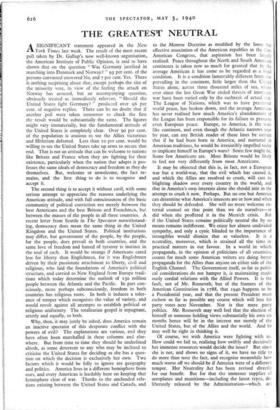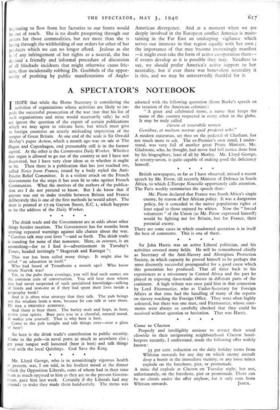THE GREATEST NEUTRAL
A SIGNIFICANT statement appeared in the New York Times last week. The result of the most recent poll taken by Dr. Gallup's now well-known organisation, ,the American Institute of Public Opinion, is said to have shown that on the question "Was Germany justified in marching into Denmark and Norway? " 93 per cent. of the persons canvassed answered No, and 7 per cent. Yes. There is nothing surprising about that, except perhaps the size of the minority vote, in view of the feeling the attack on Norway has aroused, but an accompanying question, obviously treated as immediately relevant, "Should the United States fight Germany?" produced over 96 per cent. of negative replies. There can be no doubt that if another poll were taken tomorrow to check the first the result would be substantially the same. The figures might vary immaterially, but the fundamental attitude of the United States is completely clear. Over 90 per cent. of the population is anxious to see the Allies victorious and Hitlerism defeated. Less than 10 per cent. would be willing to see the United States take up arms to secure that end. That is not an attitude that can be welcome to nations like Britain and France when they are fighting for their existence, particularly when the nation that adopts it pro- fesses the same ideals of democracy and freedom as they do themselves. But, welcome or unwelcome, the fact re- mains, and the first thing to do is to recognise and accept it.
The second thing is to accept it without cavil, with some serious attempt to appreciate the reasons underlying the American attitude, and with full consciousness of the basic community of political conviction• not merely between the best Americans and the best Britons and Frenchmen, but between the masses of the people in all three countries. A recent letter from Seattle in The Spectator notwithstand- ing, democracy does mean the same thing in the United Kingdom and the United States. Political institutions may diffet, but government of the people, by the people, for the people, does prevail in both countries, and the same love of freedom and hatred of tyranny is instinct in the soul of each. It would be strange if Americans cared less for liberty than Englishmen, for it was Englishmen driven by their passionate attachment to liberty, civil and religious, who laid the foundations of America's political structure, and carried to New England from Europe tradi- tions which today determine the outlook of 130 million people between the Atlantic and the Pacific. In part con- sciously, more perhaps subconsciously, freedom in both countries has religious roots. In both it induces a toler- ance of temper which recognises the value of variety, and would revolt against all attempts to establish political or religious uniformity. The totalitarian gospel is repugnant, utterly and equally, to both.
Why, then, it may justly be asked, does America remain an inactive spectator of this desperate conflict with the powers of evil? The explanations are various, and they have often been marshalled in these columns and else- where. But from time to time they should be underlined afresh, as some deterrent to any who may be inclined to criticise the United States for deciding as she has a ques- tion on which the decision is exclusively her own. Two factors which it would be folly to ignore are geography and politics. America lives in a different hemisphere from ours, and every American is laudably bent on keeping that hemisphere clear of war. Thanks to the unclouded rela- tions existing between the United States and Canada, and to the Monroe Doctrine as modified by the loose but effective association of the American republics in the Pan_ American Congress, that aspiration has been largely realised. Peace throughout the North and South American continents is taken now so much for granted that by the average American it has come to be regarded as a fixed condition. It is a condition lamentably different from that prevailing in the continent, little larger than the United States alone, across three thousand miles of sea, where ever since the last Great War ended threats of imminent war have been varied only by the outbreak of actual war. The League of Nations, which was to have preserved world peace, has broken down, and the average American has never realised how much America's abandonment of the League has been responsible for its failure to preserve even European peace. Europe, to America, is the war- like continent, and even though the Atlantic narrows year by year, can any British reader of these lines be certain that if he had been born in America, and nurtured in American traditions, he would be irresistibly impelled today to implicate himself in Europe's wars? Some few might be. Some few Americans are. Most Britons would be likely to feel not very differently from most Americans.
It may be objected that this is, in fact, not a European war but a world-war, that the evil which has caused it, and which the Allies are resolved to crush, will cast its blighting shadow over every country in the world, and that in America's own interests alone she should join in the attempt to crush it now. Perhaps. But no one but America can determine what America's interests are or how and when they should be defended. She will no more welcome ex- ternal counsel on that point than we do ourselves—or did when she proffered it in the Munich crisis. But if the United States remains politically neutral she by no means remains indifferent. We enjoy her almost undivided sympathy, and only a cynic blinded to the importance of intangibles would dismiss that as valueless. It is a neutrality, moreover, which is strained all the time in practical matters in our favour. In a world in which propaganda, in the opinion of politicians of all countries, counts for much some American writers are doing better propaganda for the Allies than anyone on either side of the English Channel. The Government itself, so far as politi- cal considerations do not hamper it, is maintaining studi- ously cordial relations with the Allied Powers. It is the fault, not of Mr. Roosevelt, but of the framers of the American Constitution in 1788, that 1940 happens to be a Presidential year, and that the present President must eschew so far as possible any course which will lose his party votes next November. Nor is that mere party politics. Mr. Roosevelt may well feel that the election of himself or someone, holding views substantially his own six months hence will be in the interest not merely of the United States, but of the Allies and the world. And he may well be right in thinking it.
Of course, we wish America were fighting with us. How could we fail to, realising how swiftly and decisively her immense resources would decide the issue? But since she is not, and shows no signs of it, we have no title to do more than note the fact, and recognise meanwhile how much worse off we should be if America were of a different temper. Her Neutrality Act has been revised directly for our benefit. But for that the immense supplies of aeroplanes and munitions—including the latest types, de- liberately released by the Administration—which are beginning to flow from her factories to our fronts would be out of reach. She is no doubt prospering through our orders for those commodities, but not more than she is losing through the withholding of our orders for other of her products which we can no longer afford. Jealous as she is of any infringement of her rights as a neutral, she has devised a friendly and informal procedure of discussion of all blockade incidents that might otherwise cause fric- tion, thus incidentally robbing Dr. Goebbels of the oppor- tunity of profiting by public manifestations of Anglo- American divergence. And at a moment when we are deeply involved in the European conflict America is main- taining in the Far East an unsleeping vigilance which serves our interests in that region equally with her own ; the importance of that may become increasingly manifest —it might even take the form of active co-operation there— if events develop as it is possible they may. Needless to say, we should prefer America's active support to her neutrality, but if ever there was benevolent neutrality it is this, and we may be unreservedly thankful for it.



































 Previous page
Previous page